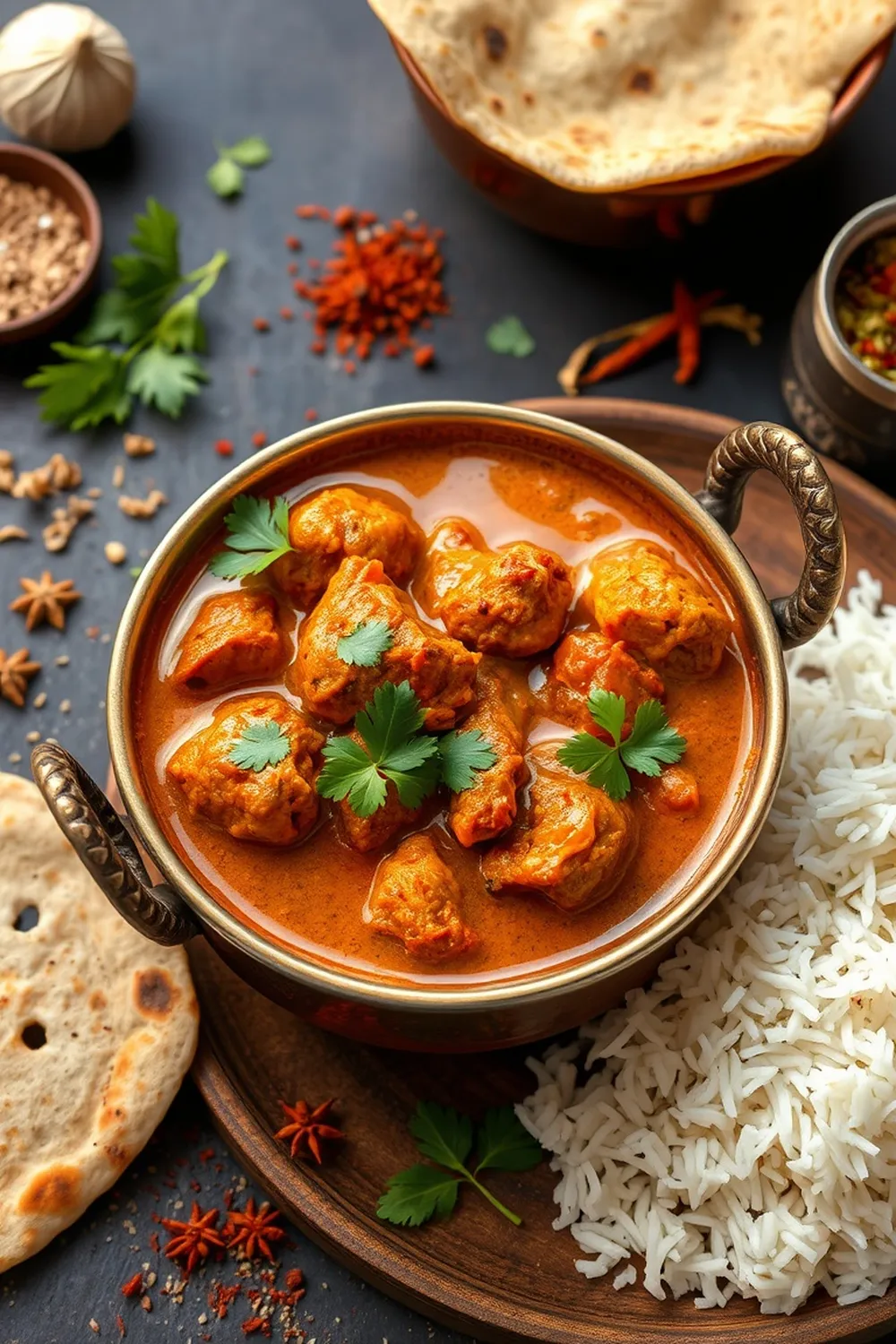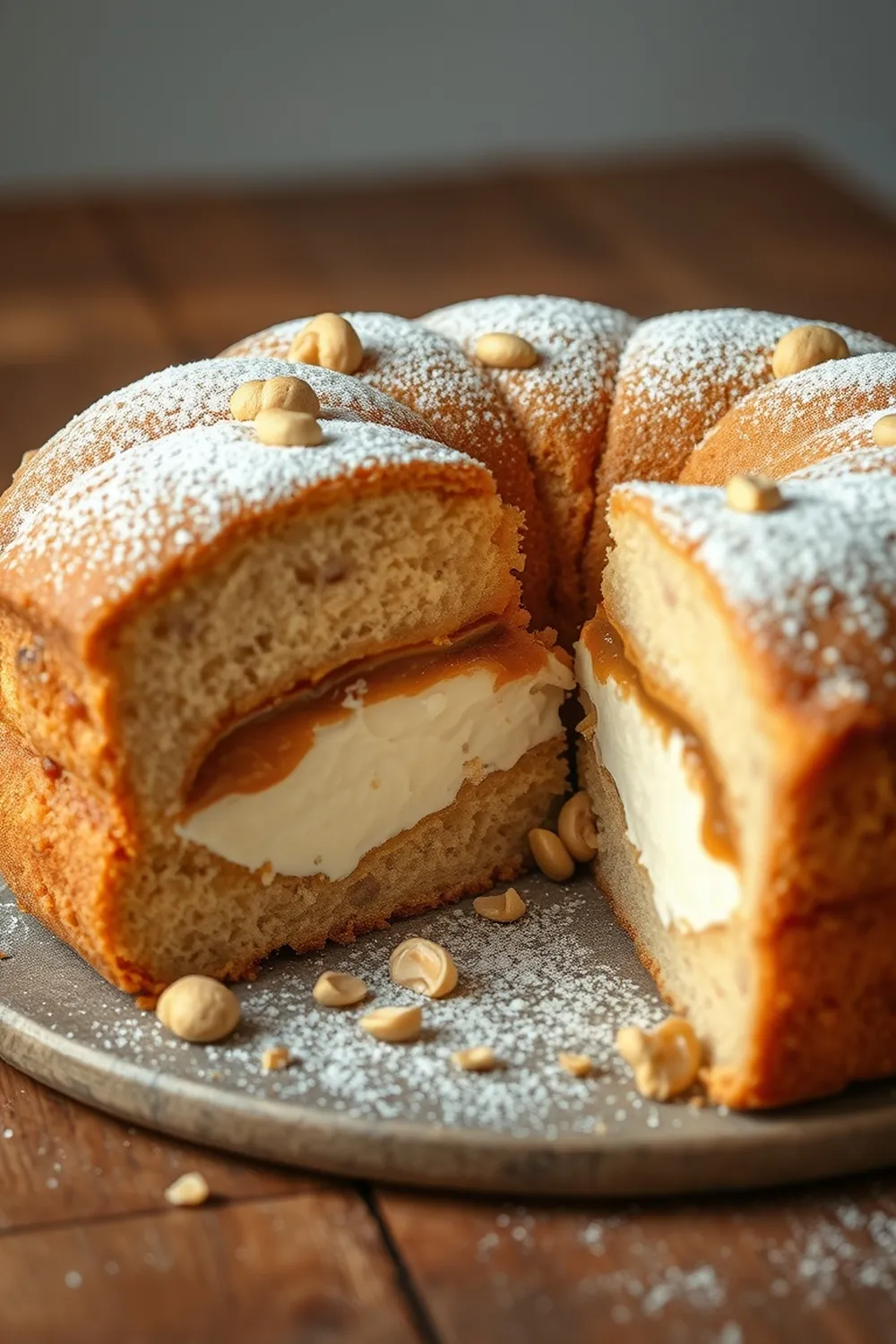- Marinate chicken with Kashmiri chili powder, turmeric, yogurt, salt, and oil. Let sit for 30 minutes.
- Grind coconut, cashews, cloves, cardamom, cumin, fennel, and star anise into a coarse paste.
- Heat ghee in a pan. Sauté sliced onions until golden brown.
- Add ginger-garlic paste and sauté for 1 minute.
- Mix in the ground paste, coriander powder, and chili powder. Cook for 5 minutes.
- Add marinated chicken, garam masala, tomato puree, sugar, and salt. Cover and cook until chicken is tender, stirring occasionally.
- Pour in coconut milk and simmer for 5 more minutes.
- Garnish with fresh coriander leaves and serve hot with rice or chapati.
- Calories:550 kcal25%
- Energy:2301 kJ22%
- Protein:30 g28%
- Carbohydrates:40 mg40%
- Sugar:10 mg8%
- Salt:800 g25%
- Fat:35 g20%
Last Updated on 6 months ago by Neha Deshmukh
Kashmiri Chicken Curry Recipe – Coconut & Cashew Based Delight
Introduction
Oh, Kashmiri Chicken Curry. Just the name evokes images of vibrant colors and incredibly fragrant spices, doesn’t it? This isn’t your everyday Indian curry; it’s a special one. I first stumbled upon this recipe during a trip to Kashmir, and I’ve been trying to recreate its magic in my kitchen ever since. It’s a little more involved than some curries, but trust me – the depth of flavor is so worth it. It’s a creamy, mildly spicy delight, and I’m so excited to share it with you!
Why You’ll Love This Recipe
This Kashmiri Chicken Curry is a real showstopper. It’s a beautiful dish, perfect for a weekend dinner or a special occasion. The coconut and cashew paste creates a richness you won’t find in many other Indian curries. Plus, the use of Kashmiri chili powder gives it a gorgeous red hue and a lovely, gentle heat. It’s a flavor experience you won’t soon forget!
Ingredients
Here’s what you’ll need to create this Kashmiri masterpiece:
- 1 kg chicken, cut into pieces (about 2.2 lbs)
- 1 tsp Kashmiri chili powder
- 1 tsp turmeric powder
- 1 tbsp yogurt
- 1 tsp oil
- 0.5 cup grated coconut (about 50g)
- 2 tbsp cashew nuts (about 30g)
- 2 cloves
- 4 cardamoms
- 1 tsp cumin seeds
- 1 tsp fennel seeds
- 1 small piece star anise
- 1 tbsp ghee
- 1 large onion, finely sliced
- 1 tbsp ginger-garlic paste
- 1 tbsp coriander powder
- 1 tsp garam masala powder
- 1 large tomato, pureed (about 200g)
- 1 tsp sugar
- 0.25 cup thin coconut milk (about 60ml)
- 4 tbsp chopped coriander leaves, for garnish
Ingredient Notes
Let’s talk ingredients! A few little tips can make all the difference:
- Kashmiri Chili Powder: The Source of Color and Mild Heat This is key. It provides that beautiful red color without a ton of heat. If you can’t find it, you can substitute with regular chili powder, but reduce the amount and maybe add a pinch of paprika for color.
- Coconut & Cashew Paste: The Heart of Kashmiri Flavor Don’t skip making this from scratch! It really elevates the curry. I like to soak the cashews in warm water for about 15-20 minutes to make them easier to grind.
- Ghee: Traditional Fat for Authentic Taste Ghee adds a wonderful nutty flavor. If you don’t have ghee, you can use vegetable oil, but ghee really does make a difference.
- Regional Variations in Spice Blends Every family in Kashmir has their own little twist on this recipe. Feel free to adjust the spices to your liking! Some people add a pinch of saffron for extra luxury.
Step-By-Step Instructions
Alright, let’s get cooking!
- First, let’s marinate the chicken. In a bowl, combine the chicken with Kashmiri chili powder, turmeric powder, yogurt, oil, and a pinch of salt. Give it a good mix and let it sit for at least 30 minutes. This tenderizes the chicken and lets the flavors really soak in.
- While the chicken marinates, let’s make that amazing coconut-cashew paste. Grind the grated coconut, cashew nuts, cloves, cardamom, cumin seeds, fennel seeds, and star anise into a coarse paste using a little water. A food processor or blender works best for this.
- Now, heat the ghee in a large pan or pot over medium heat. Add the sliced onions and sauté until they turn golden brown and beautifully caramelized. This takes patience, but it’s worth it!
- Add the ginger-garlic paste and sauté for another minute until fragrant. You don’t want it to burn, so keep stirring.
- Time for the spice magic! Add the ground coconut-cashew paste, coriander powder, and chili powder to the pan. Cook for about 5 minutes, stirring constantly, until the paste thickens and the raw smell disappears.
- Add the marinated chicken to the pan and mix well to coat it with the spice mixture. Sprinkle in the garam masala powder, add the tomato puree, sugar, and salt. Give everything a good stir, then cover the pan and let it cook until the chicken is tender – about 20-25 minutes, stirring occasionally to prevent sticking.
- Finally, pour in the coconut milk and simmer for another 5 minutes. This adds a lovely creaminess and ties all the flavors together.
- Garnish with fresh coriander leaves and serve hot with rice or chapati.
Expert Tips
A few little secrets to make your Kashmiri Chicken Curry even better:
- Achieving the Perfect Curry Consistency If the curry is too thick, add a splash of water or coconut milk. If it’s too thin, cook it uncovered for a few more minutes to allow some of the liquid to evaporate.
- Balancing the Spice Levels Taste as you go! Adjust the chili powder and garam masala to your preference.
- Marination Time for Tender Chicken The longer you marinate the chicken, the more tender it will be. Overnight is ideal, but 30 minutes is a good starting point.
- Using Fresh vs. Store-Bought Spices Freshly ground spices have the most flavor. If you can, grind your own cumin and fennel seeds.
Variations
Let’s get creative!
- Vegan Kashmiri Chicken Curry (with Tofu or Jackfruit) Substitute the chicken with firm tofu or young jackfruit. Marinate them in the same spice mixture and follow the rest of the recipe as usual.
- Gluten-Free Kashmiri Chicken Curry This recipe is naturally gluten-free! Just double-check that your garam masala doesn’t contain any gluten-containing ingredients.
- Spice Level Adjustment: Mild, Medium, Hot Reduce or increase the amount of Kashmiri chili powder to adjust the heat. For a hotter curry, add a pinch of cayenne pepper.
- Festival Adaptations: Serving During Special Occasions This curry is often served during festivals and celebrations in Kashmir. You can add a sprinkle of saffron for an extra touch of elegance.
Serving Suggestions
This curry is fantastic with:
- Steamed basmati rice – it soaks up all that delicious sauce!
- Warm chapati or naan bread – perfect for scooping up every last bit.
- A side of raita (yogurt dip) – to cool down the palate.
- A simple salad – for a fresh contrast.
Storage Instructions
Leftovers can be stored in an airtight container in the refrigerator for up to 3 days. Reheat gently on the stovetop or in the microwave. It actually tastes even better the next day as the flavors meld together!
FAQs
Let’s answer some common questions:
- What makes Kashmiri Chicken Curry different from other Indian curries? The use of Kashmiri chili powder, coconut, and cashews gives it a unique flavor and color profile. It’s generally milder and creamier than many other Indian curries.
- Can I use store-bought curry paste instead of making my own? While you can, it won’t have the same depth of flavor. Making the paste from scratch is really worth the effort.
- How can I adjust the sweetness in this curry? Adjust the amount of sugar to your liking. Some people prefer a slightly sweeter curry, while others prefer it less sweet.
- What is the best type of rice to serve with Kashmiri Chicken Curry? Basmati rice is the classic choice. Its long grains and delicate flavor complement the curry perfectly.
- Can this curry be made ahead of time? Yes! You can make it a day or two in advance. The flavors will actually develop even more overnight.










